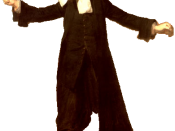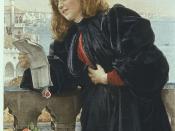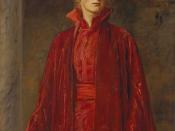This key passage, taken from ShakespeareÃÂs The Merchant of Venice, is a soliloquy given by Bassanio as he debates which of the caskets will grant him PortiaÃÂs hand in marriage. Some of the playÃÂs recurring themes are employed here by the playwright, particularly that of appearance versus reality. This theme is explored through an assortment of examples and allusions as Bassanio carefully considers the riddle of the caskets. BassanioÃÂs character is given dramatic metaphors and allusions to mythology as he reasons his way to choosing the lead casket. Shakespeare presents his audience a speech that is pivotal to the romantic aspect of the plot, and interweaves the verse with devices that makes BassanioÃÂs reasoning more engaging than a short and logical decision would be.
This soliloquy is written by Shakespeare in blank verse as is common to speech in his plays that features deep emotion and reflection. Because Bassanio is reasoning to himself in order to make a choice that grants him marriage to the woman he loves, the soliloquy is evidently one that can be considered emotion-driven.
This decision is pivotal to the romantic aspect of the plot: should Bassanio choose the proper casket, he will marry Portia, hence needing neither AntonioÃÂs wealth nor any form of companionship from him. The passage does not focus on love itself, but the theme of appearance versus reality, introduced with the line ÃÂSo may the outward shows be least themselvesÃÂ. This theme is seen elsewhere in the play in the disguises of Portia and Nerissa as men. The soliloquy is tied in with other acts of the play as well through the themes of law and religion. ÃÂIn law, what plea so tainted and corrupt...ÃÂ explains the way in which a lie may obscure an evil truth in court. Bassanio speaks of religion as not being exempt from outward deception, explain how it may also conceal wrong: ÃÂIn religion / What damned error, but some sober brow / Will bless it...Hiding the grossness.ÃÂ Bassanio was played a song to serve as a clue from Portia in choosing the casket and to lead him in a certain direction of thought. It is unclear whether it is BassanioÃÂs own wisdom or the song that points him to the correct choice. His speech focuses partially on metaphor and allusions that invoke the idea of what real beauty is, so as a character he should be given credit for his understanding of this aspect of appearance and reality.
Bassanio recognizes that beauty is not merely a reflection of outward appearance. This is made clear with his line: ÃÂLook on beauty, / And you shall see ÃÂtis purchased by the weight...Making them lightest that wear most of itÃÂ. He refers to cosmetics being a way of purchasing beauty. However as the audience knows Bassanio is making an argument against outward appearance, it can be interpreted that being ÃÂlightestÃÂ is, to him, lightest in morality or true beauty. His reference to ÃÂgolden locksÃÂ of ÃÂsupposed fairnessÃÂ again allows him to reason that their beautiful appearance is a deception and the golden hair consists of a wig. The locks are said to be ÃÂsnakyÃÂ and have been ÃÂbredÃÂ, invoking serpent-like imagery. Similarly, the image of their origin on a ÃÂskullÃÂ sharply contrasts to any of BassanioÃÂs ideas of what beauty is. The symbols of serpents and skulls represent evil in the Catholic tradition, and as the playÃÂs intended audience was of this religion, Shakespeare may have drawn upon this to help them identify with BassanioÃÂs reasoning.
In addition to the aspect of real beauty, Bassanio also discusses the nature of appearance and reality in bravery. The reference to cowards wearing ÃÂthe beards of Hercules and frowning MarsÃÂ implies that they hide behind an outward show of courage. Shakespeare draws upon Greek mythology as a source of ideas for BassanioÃÂs thoughts: Hercules and Mars are archetypes of courage and strength. It is also said they have ÃÂlivers white as milkÃÂ ÃÂ a simile referring to the belief a brave person had a red liver. Not unlike this consideration of cowardice is the simile ÃÂhearts are all as false / As stairs of sandÃÂ. Shakespeare uses this simile to show the audience an intricate visual image of a crumbling effect, and at the same time a metaphor for the way a coward may lack strength and collapse. As BassanioÃÂs character speaks of menÃÂs courage repeatedly in relation to appearance and reality, it seems he is inferring that he acts true to himself, that he is not projecting himself falsely to Portia.
Underlying BassanioÃÂs entire soliloquy is the parallel idea that is the reason for his speech: the casket he must choose. The caskets, each of a different metal, all have their own symbolic meanings, and this is acknowledged in the play itself. Each of the two incorrectly chosen caskets provided PortiaÃÂs suitor with a message explaining the fault in picking either gold or silver. When Bassanio has thought through the nature of courage and beauty, having decided that appearance is not what defines them, he reaches the subject of the caskets themselves. He approaches them similarly, with further metaphors provided by Shakespeare. The gold is ÃÂgaudy,ÃÂ the most outwardly but negatively beautiful (just like cosmetics and wigs). He is reminded by the myth of ÃÂMidasÃÂ that greed for gold results in downfall, and therefore gold is the last choice for Bassanio. Silver is likened to a lowly labourer in a metaphor for its use as money passed ÃÂÃÂTween man and manÃÂ and is discarded without further discussion. This leaves to Bassanio with the choice of lead, described as ÃÂmeagreÃÂ and ÃÂpale.ÃÂ The lead fits all parts of his thoughts preceding his choice: outward appearance has no value, ÃÂeloquenceÃÂ does not influence Bassanio now. This fits the will of PortiaÃÂs father who presumably would have wanted a husband for his daughter that understands the importance of inner beauty. Shakespeare markedly ends the soliloquy in a couplet, rhyming ÃÂeloquenceÃÂ and ÃÂconsequenceÃÂ for dramatic effect for the moments before the casket is opened and reveals the portrait the audience has expected.
Shakespeare makes multiple uses of BassanioÃÂs soliloquy. It ties up the comedyÃÂs romantic plotline, now allowing for the matter on AntonioÃÂs debt to be dealt with. The lesson on morality told through the extract can clearly be seen as a reflection on Christian virtues, explored diversely though metaphor, allusion, simile, and the symbols of the caskets themselves. The audience is drawn in by the passage and entertained by its judgements.
Bibliography:All quotes from: The Merchant of Venice by William Shakespeare





